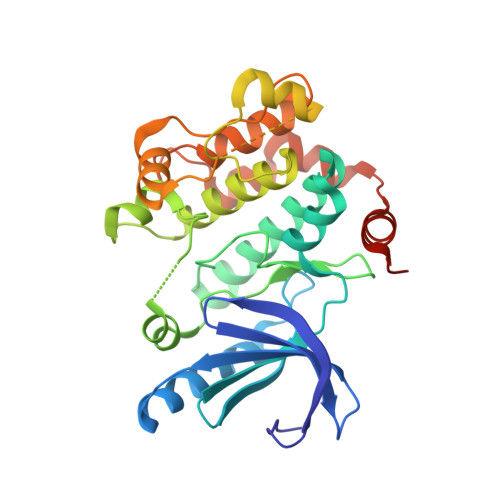4-anilino-5-carboxamido-2-pyridone derivatives as noncompetitive inhibitors of mitogen-activated protein kinase kinase.
Spicer, J.A., Rewcastle, G.W., Kaufman, M.D., Black, S.L., Plummer, M.S., Denny, W.A., Quin, J., Shahripour, A.B., Barrett, S.D., Whitehead, C.E., Milbank, J.B., Ohren, J.F., Gowan, R.C., Omer, C., Camp, H.S., Esmaeil, N., Moore, K., Sebolt-Leopold, J.S., Pryzbranowski, S., Merriman, R.L., Ortwine, D.F., Warmus, J.S., Flamme, C.M., Pavlovsky, A.G., Tecle, H.(2007) J Med Chem 50: 5090-5102
- PubMed: 17880056
- DOI: https://doi.org/10.1021/jm0704548
- Primary Citation of Related Structures:
2P55 - PubMed Abstract:
A new series of MEK1 inhibitors, the 4-anilino-5-carboxamido-2-pyridones, were designed and synthesized using a combination of medicinal chemistry, computational chemistry, and structural elucidation. The effect of variation in the carboxamide side chain, substitution on the pyridone nitrogen, and replacement of the 4'-iodide were all investigated. This study afforded several compounds which were either equipotent or more potent than the clinical candidate CI-1040 (1) in an isolated enzyme assay, as well as murine colon carcinoma (C26) cells, as measured by suppression of phosphorylated ERK substrate. Most notably, pyridone 27 was found to be more potent than 1 in vitro and produced a 100% response rate at a lower dose than 1, when tested for in vivo efficacy in animals bearing C26 tumors.
Organizational Affiliation:
Auckland Cancer Society Research Centre, Faculty of Medical and Health Sciences, The University of Auckland, Private Bag 92019, Auckland 1142, New Zealand. [email protected]

















